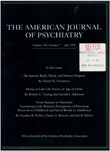Cocaine/"crack" dependence among psychiatric inpatients
Abstract
The authors studied 40 cocaine-dependent subjects admitted to psychiatric inpatient wards of a metropolitan hospital because of general psychiatric symptoms. The results indicate that the predominant form of cocaine administration (88%) was freebasing "crack." DSM-III-R cluster B personality disorders (N = 17) and schizophrenia (N = 13) constituted the diagnoses for 75% of the sample. Compared to the schizophrenic patients in this cohort, the patients with cluster B personality disorders used cocaine in greater quantities and more frequently and began abuse of the drug at an earlier age. The escalation in urban areas of psychiatric hospitalizations attributed to use of crack may be largely related to psychiatric symptoms in cocaine- dependent patients with personality disorders as well as cocaine- induced psychopathology in schizophrenic patients.
Access content
To read the fulltext, please use one of the options below to sign in or purchase access.- Personal login
- Institutional Login
- Sign in via OpenAthens
- Register for access
-
Please login/register if you wish to pair your device and check access availability.
Not a subscriber?
PsychiatryOnline subscription options offer access to the DSM-5 library, books, journals, CME, and patient resources. This all-in-one virtual library provides psychiatrists and mental health professionals with key resources for diagnosis, treatment, research, and professional development.
Need more help? PsychiatryOnline Customer Service may be reached by emailing [email protected] or by calling 800-368-5777 (in the U.S.) or 703-907-7322 (outside the U.S.).



